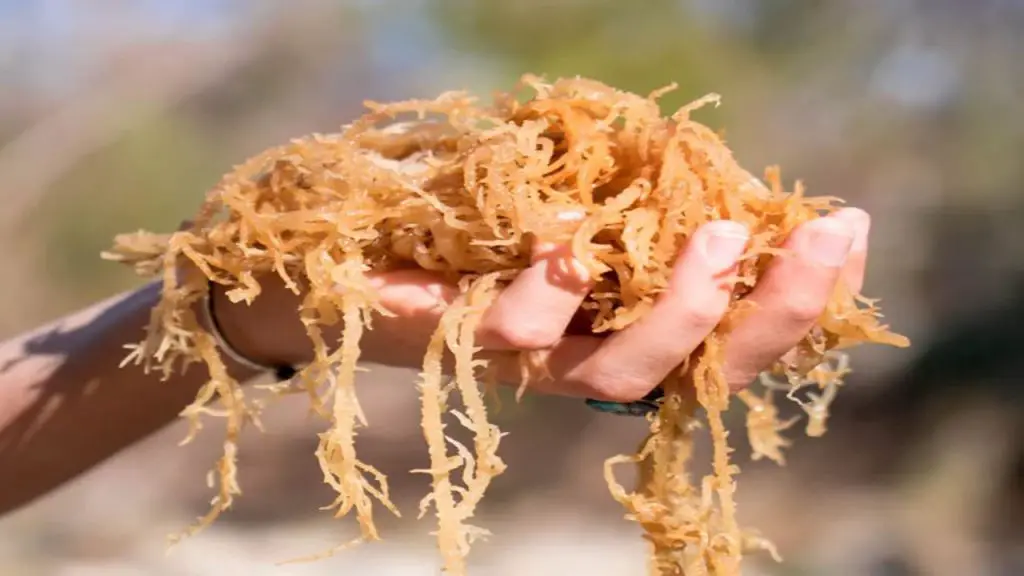Menopause, a natural phase in a woman’s life, marks the end of reproductive capabilities and brings about a significant hormonal transition. As ovaries cease to produce eggs, hormonal fluctuations occur, leading to a range of physical and emotional symptoms.
Common menopausal symptoms include hot flashes, night sweats, mood swings, and joint pain. The pursuit of natural remedies to alleviate these symptoms has led to the exploration of various options, including sea moss.
Understanding Sea Moss (Irish Moss)
Sea moss, scientifically known as Chondrus crispus, is a type of red algae found in coastal regions of North America, Europe, and the Caribbean. This marine plant has been valued for its nutritional composition, including a rich array of vitamins, minerals, and phytonutrients.
Historically, sea moss has been used in traditional medicine for its potential to support immune function, promote gut health, and boost vitality.
Nutritional Composition and Health Benefits
Sea moss is a nutritional powerhouse, boasting a diverse array of nutrients crucial for overall well-being. It contains a variety of vitamins such as vitamins A, C, E, and K, along with a spectrum of B vitamins. These vitamins play a pivotal role in maintaining skin health, and immune function, and supporting cellular processes.
Additionally, sea moss is a notable source of essential minerals like iodine, magnesium, and calcium. Iodine, in particular, is crucial for proper thyroid function, which plays a vital role in regulating hormonal balance.
Historical Use in Traditional Medicine
Throughout history, sea moss has been utilized in traditional medicine systems across different cultures. In Irish and Caribbean traditions, sea moss has been used to address a wide range of health issues, including respiratory ailments, digestive troubles, and skin conditions.
Its historical significance as a natural remedy underscores the potential benefits it might offer, especially in the context of menopause.
Potential Benefits of Sea Moss for Menopause

1. Rich in Phytonutrients and Vitamins
The phytonutrients and vitamins present in sea moss hold promise for assisting with menopausal symptoms. Some of these compounds possess antioxidant and anti-inflammatory properties, which could help mitigate oxidative stress and inflammation that contribute to discomfort during menopause.
By providing the body with these nutrients, sea moss might aid in maintaining hormonal balance and supporting overall well-being.
2. Natural Source of Iodine
Iodine deficiency can exacerbate hormonal imbalances and menopausal symptoms. Sea moss is a natural source of iodine, a crucial component for thyroid hormone production.
An optimally functioning thyroid is essential for regulating metabolism, energy levels, and hormonal equilibrium. Including sea moss in the diet could potentially support thyroid health and indirectly alleviate menopausal symptoms linked to thyroid dysfunction.
3. Anti-Inflammatory Properties and Joint Pain Relief
Joint pain and inflammation are common complaints during menopause. Sea moss’ anti-inflammatory compounds may contribute to relieving these discomforts.
Studies suggest that sea moss could potentially modulate inflammatory pathways, providing relief to menopausal women experiencing joint pain and related symptoms. While more research is needed, the anti-inflammatory potential of sea moss remains an intriguing avenue of exploration.
4. Nutrient Density and Overall Well-Being
The nutrient density of sea moss makes it an attractive dietary supplement for menopausal women. The vitamins, minerals, and phytonutrients it contains collectively support various bodily functions.
Maintaining overall health is crucial during menopause, and the comprehensive nutrient profile of sea moss might aid in managing symptoms and improving quality of life.
Impact on Hormonal Imbalance
Menopausal symptoms are primarily triggered by hormonal fluctuations, especially the decline in estrogen levels.
This hormonal imbalance leads to a range of physical and emotional changes. Sea moss, with its potential to influence hormonal balance, is of particular interest in the context of managing menopausal symptoms.
Adaptogens are natural substances that help the body adapt to stress and regulate physiological processes. Some compounds found in sea moss exhibit adaptogenic properties that could potentially assist the body in adapting to hormonal changes occurring during menopause.
By supporting the endocrine system and reducing the impact of stress, sea moss might play a role in stabilizing hormone levels and alleviating related symptoms.
While anecdotal evidence abounds, rigorous scientific research on sea moss’ effects specifically in the context of menopause is relatively limited.
However, preliminary studies suggest that sea moss could have a positive impact on hormonal balance and related symptoms. Further research is needed to validate these findings and establish the mechanisms through which sea moss influences hormonal health.
Alleviating Menopausal Symptoms
1. Reducing Hot Flashes and Night Sweats
Hot flashes and night sweats are hallmark symptoms of menopause that can significantly disrupt daily life. Sea moss’ potential to regulate body temperature and hormone levels might contribute to reducing the frequency and intensity of these episodes. The hydration and nutrient support provided by sea moss could aid in managing these discomforts.
2. Mood Stabilization and Anxiety Reduction
The hormonal changes during menopause can lead to mood swings, anxiety, and even depression. Sea moss’ nutrient-rich composition, including B vitamins and magnesium, could support neurotransmitter function and promote emotional well-being.
While not a standalone solution, incorporating sea moss into a balanced diet might contribute to stabilizing mood and reducing anxiety.
3. Improving Skin Health and Combating Dryness
Menopause often brings about changes in skin health, including dryness, wrinkles, and reduced elasticity. Sea moss’ vitamins and minerals, coupled with its potential hydration-enhancing properties, could promote skin health.
Proper hydration and nutrient supply might help combat dryness and contribute to a more vibrant complexion.
Other Considerations and Precautions
As with any dietary change or supplement, it’s crucial to consider potential interactions with medications. Sea moss’ iodine content, for instance, could interact with medications or conditions related to thyroid function.
Consulting a healthcare professional before incorporating sea moss into the diet is advisable, especially for individuals with pre-existing health conditions or those taking medications. Determining the appropriate dosage of sea moss is essential to maximize its potential benefits and minimize any risks.
While there’s no universally agreed-upon dosage, starting with small amounts and gradually increasing intake is a prudent approach. This allows the body to adapt to sea moss and minimizes the risk of adverse effects.
While sea moss shows promise in alleviating menopausal symptoms, it’s important to remember that it’s not a standalone solution.
A balanced diet rich in a variety of nutrients, combined with regular exercise and stress management, is integral to managing menopause effectively. Sea moss can be a valuable addition to this holistic approach, contributing to overall well-being.
Real-Life Experiences and Anecdotal Evidence
Personal experiences can shed light on the potential benefits of sea moss in managing menopausal symptoms. Interviews with individuals who have incorporated sea moss into their routines could provide insights into the effects they’ve observed.
These firsthand accounts, though anecdotal, can offer valuable perspectives on the practical use of sea moss during menopause.
Scientific Studies and Clinical Trials
While the scientific literature on sea moss and menopause is limited, some studies have explored its potential effects on hormonal health. These studies often focus on the plant’s anti-inflammatory properties, hormonal regulation, and potential benefits for specific symptoms.
While these findings are promising, more robust research, including randomized controlled trials, is needed to establish sea moss’ effectiveness conclusively.
Integrating Sea Moss into a Menopausal Lifestyle
- Consulting Healthcare Professionals: Before making any significant dietary changes, especially during menopause, consulting healthcare professionals is essential. Physicians, nutritionists, or dietitians can provide personalized guidance based on individual health profiles and existing medical conditions.
- Incorporating Sea Moss into Recipes and Routines: Sea moss can be consumed in various forms, such as gels, smoothies, and soups. Experimenting with different recipes and finding enjoyable ways to incorporate sea moss into daily routines can make the experience more sustainable. Integrating it into a well-rounded diet ensures a consistent supply of nutrients that could support menopausal health.
- Monitoring and Tracking Progress: Keeping track of changes and improvements is crucial when incorporating sea moss into a menopausal lifestyle. Tracking symptoms, mood, energy levels, and overall well-being can help determine whether sea moss is contributing positively. Regular self-assessment provides valuable insights into the effectiveness of this natural remedy.
Conclusion
Exploring natural remedies for managing menopausal symptoms is an ongoing endeavor, and sea moss presents a promising avenue. Its nutrient-rich composition, potential hormonal regulation effects, and historical use in traditional medicine allude to its potential benefits for menopausal women.
However, it’s important to approach sea moss as part of a holistic approach to menopausal health, encompassing dietary choices, exercise, stress management, and professional medical advice.
While further research is needed to establish sea moss’ efficacy conclusively, its potential to alleviate menopausal symptoms remains a topic of intrigue and exploration.
FAQs:
A1: Sea moss, also known as Irish moss, is a type of red algae rich in nutrients and historically used for its potential health benefits. In the context of menopause, sea moss is being explored for its potential to alleviate menopausal symptoms due to its nutritional composition and adaptogenic properties.
A2: Sea moss contains phytonutrients and vitamins that might contribute to maintaining hormonal balance.
Some compounds in sea moss are thought to have adaptogenic properties, which could help the body adapt to hormonal changes, potentially alleviating symptoms like hot flashes, mood swings, and joint pain.
A3: While scientific evidence is limited, the nutrient profile of sea moss, coupled with its potential adaptogenic effects, suggests that it might assist in reducing the frequency and intensity of hot flashes and night sweats. However, individual responses may vary.
A4: Iodine is essential for thyroid function, which plays a role in regulating hormones. Sea moss is a natural source of iodine, and maintaining proper thyroid function could indirectly contribute to hormonal balance during menopause.
A5: Sea moss contains B vitamins and magnesium, which are important for neurotransmitter function and emotional well-being. Incorporating sea moss into a balanced diet might help stabilize mood and reduce anxiety associated with menopause.
A6: While preliminary studies suggest sea moss may have positive effects on hormonal balance and related symptoms, robust scientific research specific to menopause is limited. More research, including controlled trials, is needed to establish its effectiveness conclusively.
Additional Posts:

